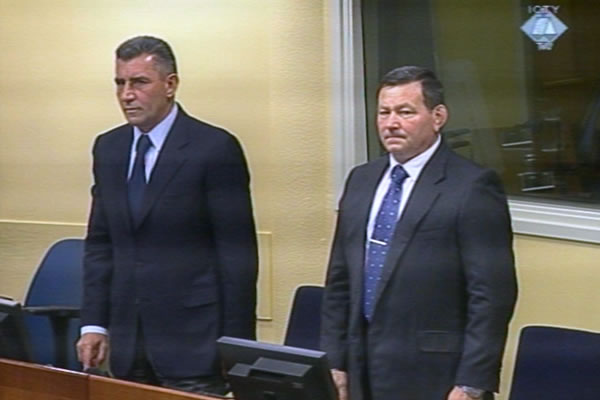Home
GOTOVINA’S DEFENSE DENIES UNLAWFUL ATTACKS ON CIVILIANS
In the first part of the appellate hearing in the Operation Storm case, General Ante Gotovina’s defense exchanged arguments with the prosecution. The defense challenged the Trial Chamber’s finding about the existence of a joint criminal enterprise aimed at permanently eliminating Serb civilians from Krajina. The Trial Chamber found that the aim was implemented through an unlawful attack on civilians in Knin and other towns in Krajina in August 1995
 Ante Gotovina and Mladen Markac in the courtroom
Ante Gotovina and Mladen Markac in the courtroom The Trial Chamber’s findings about the existence of a joint criminal enterprise aimed at permanently expelling Serb civilians from Krajina are based on an erroneous conclusion that all artillery impacts that fell outside of a 200-meter radius from the nearest military targets were unlawful, General Ante Gotovina’s defense contends. At the appellate hearing in the Operation Storm case, the defense noted that the Trial Chamber ‘invented’ this standard and then used it as a basis for two findings: that the attacks on Knin, Obrovac, Benkovac and Gracac were unlawful and that there was a joint criminal enterprise. The Trial Chamber sentenced General Ante Gotovina to 24 and General Mladen Markac to 18 years in prison for crimes against Krajina Serbs. Both defenses appealed against the judgment.
As Gotovina’s defense lawyer Luka Misetic said, the Trial Chamber says in its judgment that only five percent of the 1,200 shells fired on Knin and other Krajina towns on 4 and 5 August 1995 fell outside of the 200-meter radius. The defense contends that the prosecution failed to prove that the buildings in the areas designated as civilian by the Trial Chamber were in fact been used for civilian purposes only.
According to the defense, these circumstances indicate that General Gotovina issued an order for a lawful attack on legitimate military targets in Operation Storm in early August 1995. Furthermore, no evidence was called during the trial about the deaths or injuries to civilians caused by the shelling of Knin. Not ‘a single rumor’ has surfaced in the eighteen years since Operations Storm about any civilians who may have been harmed in it.
In his response to the defense, prosecutor Douglas Stringer said that the Trial Chamber concluded that the 200-meter radius was legitimate based on the evidence of a prosecution military expert. Even if the Appeals Chamber rejects the finding, the Trial Chamber’s conclusion about the unlawfulness of the attacks may continue to stand. The prosecution contends there is ample evidence to support this finding, such as Gotovina’s order of 2 August 1995 in which Gotovina says that the artillery should attack the enemy front lines and other military targets and ‘put towns of Knin, Benkovac, Obrovac and Gracac under artillery fire’. The Croatian Army reports also stated that urban areas were attacked indiscriminately. One such document reports that 18 projectiles were fired ‘on the general area of Knin’.
The prosecution contests the defense’s claim that 95 percent of the shells hit areas with military targets, recalling that the Trial Chamber established the exact impact sites for only 10 percent of the fired projectiles. Half of these hit civilian areas. The prosecution contends that the shell impact analysis showed they were ‘distributed all over entire towns’. Prosecutor Matthew Cross asked if it was really necessary to fire 900 shells on Knin in a day and a half. At the time there were only 150 soldiers and 15,000 civilians in Knin.
The prosecution responded to the claim that the shelling didn’t injure or kill a single civilian by insisting that witnesses spoke about the bodies strewn in the streets of Knin. The prosecution did not have to call detailed evidence about those deaths and injuries because its case was that the attacks were carried out to persecute, not kill, civilians. As the prosecution noted, those who had to flee Krajina because of this unlawful attack could also be counted as victims of the shelling.
Today, the prosecution noted that the unlawful attack on Knin was just one of the elements in the joint criminal enterprise, calling on the Appeals Chamber to look at the evidence in its entirety: from the plans to expel civilians made at the Brijuni meeting to the shelling during Operation Storm, the murder of civilians, looting and destruction of their homes and other crimes General Gotovina failed to investigate and prevent, and finally the effort to prevent the refugees from returning. The accused didn’t take an active part in this effort, but other participants of the joint criminal enterprise headed by President Franjo Tudjman did.
Linked Reports
- Case : Gotovina et al. - "Operation Storm"
- 2012-04-24 KEY ISSUES DEFINED FOR APPELLATE HEARING IN OPERATION STORM CASE
- 2012-04-20 GOTOVINA AND MARKAC TO RETURN TO COURT SOON AFTER THEIR APPELLATE HEARING
- 2012-04-05 GOTOVINA AND MARKAC WILL FACE APPEALS CHAMBER ON 14 MAY
- 2012-07-20 MODES OF LIABILITY FOR GOTOVINA AND MARKAC
- 2012-09-04 NEITHER INDIVIDUAL NOR COMMAND LIABILITY FOR GOTOVINA AND MARKAC
- 2012-09-18 GOTOVINA AND MARKAC BACK IN COURT FOR A SHORT TIME
